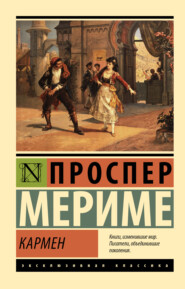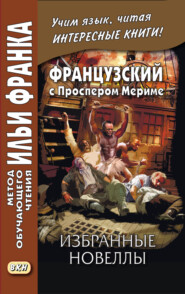По всем вопросам обращайтесь на: info@litportal.ru
(©) 2003-2025.
✖
Colomba
Настройки чтения
Размер шрифта
Высота строк
Поля
“O.D.R.”
Miss Lydia had turned away while she read the letter, and Colomba, who was watching her closely, gave her the Egyptian ring, with an inquiring glance as to what it all meant. But Miss Lydia dared not raise her head, and looked dejectedly at the ring, alternately putting it on her finger and pulling it off again.
“Dear Miss Nevil,” said Colomba, “may I not know what my brother says to you? Does he say anything about his health?”
“Indeed,” said Miss Lydia, colouring, “he doesn’t mention it. His letter is in English. He desires me to tell my father—He hopes the prefect will be able to arrange–”
With a mischievous smile, Colomba sat down on the bed, took hold of both Miss Nevil’s hands, and, looking at her with her piercing eyes—
“Will you be kind?” she said. “Won’t you answer my brother’s letter? You would do him so much good! For a moment I thought of waking you when his letter came, and then I didn’t dare!”
“You did very wrong,” replied Miss Nevil. “If a word from me could—”
“I can’t send him any letter now. The prefect has arrived, and Pietranera is full of his policemen. Later on, we’ll see what we can do. Oh, Miss Nevil, if you only knew my brother, you would love him as dearly as I do. He’s so good! He’s so brave! Just think of what he has done! One man against two, and wounded as well!”
The prefect had returned. Warned by an express messenger sent by the deputy-mayor, he had brought over the public prosecutor, the registrar, and all their myrmidons, to investigate the fresh and terrible catastrophe which had just complicated, or it may be ended, the warfare between the chief families of Pietranera. Shortly after his arrival, he saw the colonel and his daughter, and did not conceal his fear that the business might take on an ugly aspect.
“You know,” he said, “that the fight took place without witnesses, and the reputation of these two unhappy men stood so high, both for bravery and cunning, that nobody will believe Signor della Rebbia can have killed them without the help of the bandits with whom he is now supposed to have taken refuge.”
“It’s not possible,” said the colonel. “Orso della Rebbia is a most honourable fellow. I’ll stake my life on that.”
“I believe you,” said the prefect. “But the public prosecutor (those gentry always are suspicious) does not strike me as being particularly well disposed toward him. He holds one bit of evidence which goes rather against our friend—a threatening letter to Orlanduccio, in which he suggests a meeting, and is inclined to think that meeting was a trap.”
“That fellow Orlanduccio refused to fight it out like a gentleman.”
“That is not the custom here. In this country, people lie in ambush, and kill each other from behind. There is one deposition in his favour—that of a child, who declares she heard four reports, two of which were louder than the others, and produced by a heavy weapon, such as Signor della Rebbia’s gun. Unluckily, the child is the niece of one of the bandits suspected of being his accomplices, and has probably been taught her lesson.”
“Sir,” broke in Miss Lydia, reddening to the roots of her hair, “we were on the road when those shots were fired, and we heard the same thing.”
“Really? That’s most important! And you, colonel, no doubt you remarked the very same thing?”
“Yes,” responded Miss Lydia quickly. “It was my father, who is so accustomed to firearms, who said to me, ‘There’s Signor della Rebbia shooting with my gun!’”
“And you are sure those shots you recognised were the last?”
“The two last, weren’t they, papa?”
Memory was not the colonel’s strong point, but as a standing rule, he knew better than to contradict his daughter.
“I must mention this to the public prosecutor at once, colonel. And besides, we expect a surgeon this evening, who will make an examination of the two bodies, and find out whether the wounds were caused by that particular weapon.”
“I gave it to Orso,” said the colonel, “and I wish I knew it was at the bottom of the sea. At least–Plucky boy! I’m heartily glad he had it with him, for I don’t quite know how he would have got off if it hadn’t been for my Manton.”
CHAPTER XIX
It was rather late when the surgeon put in an appearance. On his road up he had met with an adventure of his own. He had been stopped by Giocanto Castriconi, who, with the most scrupulous politeness, called on him to come and attend a wounded man. He had been conducted to Orso’s retreat, and had applied the first dressings to his wound. The bandit had then accompanied the doctor some distance on his way, and had greatly edified him by his talk concerning the most celebrated professors at Pisa, whom he described as his intimate friends.
“Doctor,” said the theologian, as they parted, “you have inspired me with such a feeling of respect that I think it hardly necessary to remind you that a physician should be as discreet as a confessor.” And as he said the words he clicked the trigger of his gun. “You have quite forgotten the spot at which we have had the honour of meeting. Fare you well! I’m delighted to have made your acquaintance.”
Colomba besought the colonel to be present at the post-mortem examination.
“You know my brother’s gun better than anybody,” she said, “and your presence will be most valuable. Besides there are so many wicked people here that we should run a great risk if there were nobody present to protect our interests.”
When she was left alone with Miss Lydia, she complained that her head ached terribly, and proposed that they should take a walk just outside the village.
“The fresh air will do me good,” she said. “It is so long since I’ve been out of doors.”
As they walked along she talked about her brother, and Miss Lydia, who found the subject tolerably interesting, did not notice that they had travelled a long way from Pietranera. The sun was setting when she became aware of this fact, and she begged Colomba to return. Colomba said she knew a cross-cut which would greatly shorten the walk back, and turning out of the path, she took another, which seemed much less frequented. Soon she began to climb a hill, so steep that to keep her balance she was continually obliged to catch hold of branches with one hand, while she pulled her companion up after her with the other. After about twenty minutes of this trying ascent, they found themselves on a small plateau, clothed with arbutus and myrtle, growing round great granite boulders that jutted above the soil in every direction. Miss Lydia was very tired, there was no sign of the village, and it was almost quite dark.
“Do you know, Colomba, my dear,” she said, “I’m afraid we’ve lost our way!”
“No fear!” answered Colomba. “Let us get on. You follow me.”
“But I assure you we’re going wrong. The village can’t be over there. I’m certain we’re turning our backs on it. Why, look at those lights, far away. Pietranera must be in that direction.”
“My dear soul,” said Colomba, and she looked very much agitated, “you’re perfectly right. But in the maquis—less than a hundred yards from here—”
“Well?”
“My brother is lying. If you choose, I might see him, and give him one kiss.”
Miss Nevil made a gesture of astonishment.
“I got out of Pietranera without being noticed,” continued Colomba, “because I was with you, otherwise I should have been followed. To be so close to him, and not to see him! Why shouldn’t you come with me to see my poor brother? You would make him so happy!”
“But, Colomba—That wouldn’t be at all proper on my part–”
“I see. With you women who live in towns, your great anxiety is to be proper. We village women only think of what is kind.”
“But it’s so late! And then what will your brother think of me?”
“He’ll think his friends have not forsaken him, and that will give him courage to bear his sufferings.”
“And my father? He’ll be so anxious!”
“He knows you are with me. Come! Make up your mind. You were looking at his picture this morning,” she added, with a sly smile.
“No! Really and truly, I don’t dare, Colomba! Think of the bandits who are there.”
“Well, what matter? The bandits don’t know you. And you were longing to see some.”
“Oh, dear!”
“Come, signorina, settle something. I can’t leave you alone here. I don’t know what might happen to you. Let us go on to see Orso, or else let us go back to the village together. I shall see my brother again. God knows when—never, perhaps!”
“What’s that you are saying, Colomba? Well, well, let us go! But only for a minute, and then we’ll get home at once.”
Colomba squeezed her hand, and without making any reply walked on so quickly that Miss Lydia could hardly keep up with her. She soon halted, luckily, and said to her companion:

















